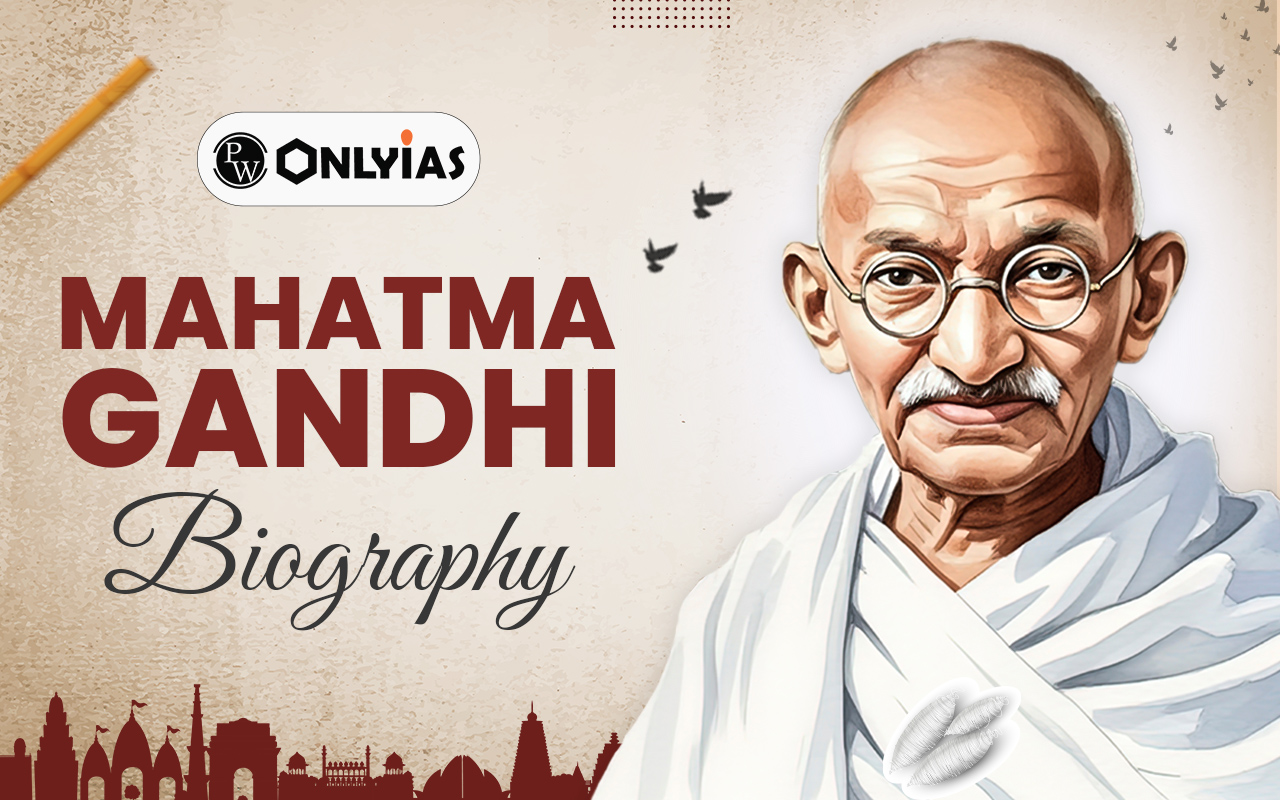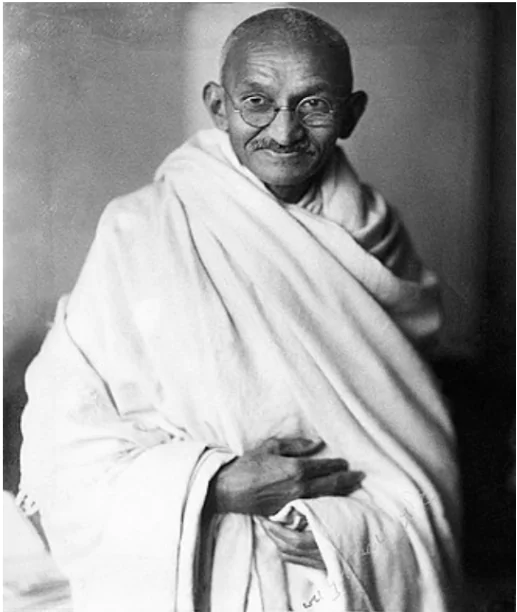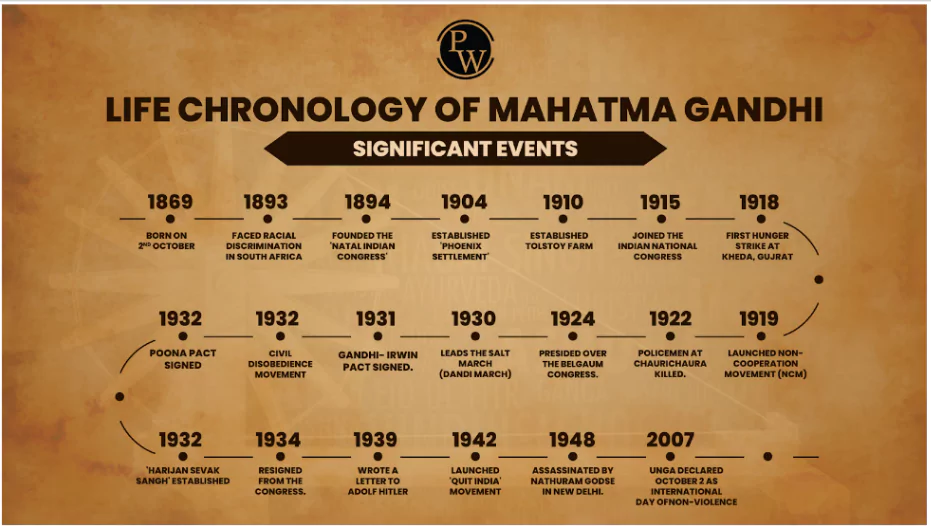Know about Mahatma Gandhi Biography, His life, struggles, and legacy in India's fight for independence, and his philosophy of nonviolence, and global impact on civil rights movements

Mahatma Gandhi, also known as Mohandas Karamchand Gandhi, was born on October 2, 1869, in Porbandar, a coastal town in present-day Gujarat, India. His birth marked the beginning of a life that would later be revered as the guiding light of India’s struggle for independence from British colonial rule. Gandhi’s teachings of nonviolence, civil disobedience, and self-reliance earned him the title of “Mahatma,” meaning “great soul,” and made him a symbol of peace and unity worldwide.
Mahatma Gandhi Jayanti 2025 was celebrated on October 2nd, marking the 156th birth anniversary of the Father of the Nation. This day honors Gandhiji’s teachings of non-violence, truth, and peace, which inspired India’s freedom struggle and continue to influence people worldwide. Across India, people remember him with prayer meetings, devotional songs, and special ceremonies, including tributes at Raj Ghat in New Delhi. It is a national holiday observed in all states where schools, government offices, and banks remain closed to pay homage to this great leader. Gandhi Jayanti is not only a day of remembrance but a reminder to live by his simple and powerful messages.
Mahatma Gandhi, born as Mohandas Karamchand Gandhi on October 2, 1869, in Porbandar, a coastal town in present-day Gujarat, India, had a childhood marked by modesty and moral values. His early life and education played a crucial role in shaping the man who would later become the guiding light of India’s struggle for independence and a global icon of peace and nonviolence.

Gandhi was born into a devout Hindu family. His father, Karamchand Gandhi, was a respected diwan (chief minister) of the Porbandar state, while his mother, Putlibai, was a deeply religious and compassionate woman. From a young age, Gandhi imbibed his parents’ values of honesty, compassion, and humility.

Gandhi received his early education in Porbandar, where he demonstrated an insatiable curiosity and love for learning. At the age of nine, he moved to Rajkot to attend the local school. Despite his inherent shyness, Gandhi proved to be an intelligent and disciplined student.
In 1888, at the age of 18, Gandhi left for London to study law. He attended University College London and later the Inner Temple to become a barrister. During his time in London, he embraced vegetarianism, a decision that would become an integral part of his life.
After completing his law studies, Gandhi returned to India in 1891 and began his legal practice. However, facing little success, he decided to move to South Africa in 1893 to work as a lawyer. It was in South Africa that Gandhi encountered the harsh reality of racial discrimination and prejudice against Indians.
Gandhi’s experiences in South Africa were transformative. Witnessing racial bias and facing discrimination himself, he felt compelled to take a stand against injustice. His personal experiences kindled the fire of resistance within him and sowed the seeds of his future philosophy of nonviolence and civil disobedience.
After spending over two decades in South Africa, where he fought against racial discrimination and injustice, Mahatma Gandhi returned to India in January 1915. His return marked a significant turning point in India’s struggle for independence. Gandhi’s leadership, philosophy of nonviolence, and unwavering commitment to truth inspired millions of Indians to join the freedom movement. Through various nonviolent campaigns, including the Salt March and Quit India Movement, he led the nation towards independence. Gandhi’s legacy as the “Father of the Nation” continues to inspire and guide people in their pursuit of truth, justice, and nonviolence. India achieved its long-cherished freedom on August 15, 1947, making Gandhi the architect of India’s independence and an enduring symbol of peace and unity worldwide.
Gandhi led various campaigns, including the Non-Cooperation Movement and the Salt March, both of which drew millions of Indians to join the fight for freedom. Through his teachings and actions, he urged his fellow countrymen to reject violence and embrace self-reliance.
Gandhi firmly believed in the unity of all Indians, regardless of their religion, caste, or social status. He championed the rights of the oppressed and marginalized sections of society, such as the untouchables, and worked tirelessly to break down the barriers of discrimination.
His message of unity and tolerance inspired people from all walks of life to join the freedom struggle, making it a truly mass movement.
Mahatma Gandhi, fondly called the “Father of the Nation,” played a pivotal role in India’s struggle for independence from British colonial rule. His leadership, philosophy of nonviolence, and unwavering commitment to truth and justice inspired millions of Indians to join the freedom movement and ultimately led to India’s independence on August 15, 1947. Let’s delve into the details of Gandhi’s role in India’s journey to freedom:
Gandhi’s philosophy of nonviolent resistance, or Satyagraha, became the cornerstone of India’s struggle for freedom. He believed in the power of truth and nonviolence as the means to achieve justice and righteousness. Gandhi’s Satyagraha involved civil disobedience and peaceful protests against unjust British laws and policies.
One of the earliest and most significant examples of Satyagraha was the Champaran movement in 1917, where Gandhi led Indian farmers in Bihar to protest against oppressive indigo plantations. The success of this movement brought Gandhi to the forefront of India’s political landscape.
In 1920, Gandhi launched the Non-Cooperation Movement, urging Indians to boycott British institutions, schools, and goods. Millions of Indians responded to his call, and the movement gained widespread support across the country. This marked the first time that the Indian masses actively participated in the freedom struggle.
The movement eventually forced the British government to make significant concessions and sparked a wave of nationalist fervor throughout India.
In 1930, Gandhi initiated the Salt March, a 240-mile journey from Sabarmati Ashram to the Arabian Sea. The march aimed to protest the British salt tax, which heavily burdened India’s poor. Thousands of Indians joined Gandhi on the march, demonstrating their unity and resolve against British oppression.
The Salt March captured the world’s attention and brought the Indian independence movement to the global stage. It also exemplified the power of nonviolent protest in challenging British rule.
In 1942, during World War II, Gandhi launched the Quit India Movement, demanding an immediate end to British rule in India. The movement called for civil disobedience and nonviolent resistance on a large scale. However, the British responded with mass arrests and brutal repression.
Despite facing severe opposition, the Quit India Movement ignited a spirit of unity and resilience among Indians, strengthening the resolve for freedom.
Throughout the freedom struggle, Gandhi emphasized the importance of unity and inclusivity. He worked to bridge the divide between different religious and social groups, promoting the rights of the oppressed and downtrodden, such as the untouchables.
Gandhi believed that an independent India could only be successful if it embraced diversity and stood united as one nation. His teachings of communal harmony and religious tolerance continue to inspire India’s ethos to this day.
As India’s freedom movement gained momentum, the British government realized the strength of the people’s aspirations for independence. Negotiations between the Indian National Congress and the British government culminated in the Mountbatten Plan, which paved the way for the transfer of power.
On August 15, 1947, India finally achieved its long-awaited freedom. Gandhi’s vision of a free India, where truth and nonviolence prevailed, had become a reality.
Gandhi’s legacy as the architect of India’s independence and his philosophy of nonviolence continue to resonate worldwide. His teachings have inspired civil rights movements and leaders across the globe, including Martin Luther King Jr. and Nelson Mandela.
Even after his passing on January 30, 1948, Gandhi’s spirit lives on, reminding us of the power of peaceful resistance and the ability to effect profound change through nonviolence and truth. Mahatma Gandhi’s role in India’s journey to freedom remains an indelible chapter in the history of the nation and serves as an enduring inspiration for generations to come.
1. Nonviolence and Satyagraha:
Gandhi’s philosophy of nonviolence, or Ahimsa, remains his most significant legacy. He believed that true strength lies not in physical force but in moral courage. Gandhi’s practice of Satyagraha, the power of truth and nonviolent resistance, inspired numerous movements and leaders worldwide, including the Civil Rights Movement in the United States led by Martin Luther King Jr.
2. Freedom Struggle and India’s Independence:
Gandhi’s role in India’s struggle for independence is unparalleled. His leadership and unwavering commitment to nonviolent civil disobedience united millions of Indians in the fight against British colonial rule. Through various movements like the Non-Cooperation Movement, Salt March, and Quit India Movement, he galvanized the masses and paved the way for India’s freedom on August 15, 1947.
3. Emphasis on Simplicity and Self-reliance:
Gandhi’s life was a testament to simplicity and self-reliance. He advocated for living a frugal life, emphasizing the importance of self-sufficiency and being in harmony with nature. His principles of self-reliance and Swadeshi (supporting indigenous products) continue to inspire sustainable living and economic empowerment.
4. Communal Harmony and Religious Tolerance:
Gandhi stressed the value of communal harmony and religious tolerance. He sought to bridge the divide between various religious and social groups, promoting unity and understanding. His respect for all religions and belief in the fundamental unity of humanity remain as guiding principles for a diverse and pluralistic India.
5. Empowerment of the Marginalized:
Gandhi was a champion of social justice and worked towards empowering the marginalized sections of society, including the untouchables. He fought against caste discrimination and advocated for their inclusion and dignity. Gandhi’s efforts contributed to the social upliftment of the oppressed and laid the groundwork for social reforms in post-independence India.
6. Global Impact and Inspiration:
Gandhi’s principles of nonviolence and peaceful resistance resonated far beyond India’s borders. His life and teachings influenced civil rights movements, anti-colonial struggles, and leaders around the world. He became a symbol of hope and resistance against injustice and oppression.
7. Influence on Modern India:
Even after his passing, Mahatma Gandhi’s ideals continue to shape India’s ethos and collective conscience. His teachings have guided the country’s leaders and people in navigating challenges and striving for a more just and inclusive society. Gandhi’s face adorns India’s currency, and his birthday, October 2nd, is celebrated as Gandhi Jayanti, a national holiday in India.
Mahatma Gandhi’s legacy stands as a beacon of light in a world often plagued by conflict and division. His timeless message of truth, nonviolence, and compassion remains a source of inspiration for those seeking to bring positive change to society. Gandhi’s vision of a just, equitable, and peaceful world continues to inspire generations, encouraging them to walk the path of truth and uphold the values of humanity. As the world remembers and cherishes his legacy, Mahatma Gandhi remains an immortal inspirer, guiding humanity towards a brighter and more harmonious future.
Mahatma Gandhi’s assassination occurred on 30 January 1948 at the hands of Nathuram Godse, a Hindu nationalist and member of the Hindu Mahasabha. Godse opposed Gandhi’s support for Pakistan and rejected his doctrine of non-violence.
Gandhi was a prolific writer and published several literary works. Some notable ones include “Hind Swaraj” in 1909, and he edited newspapers such as “Harijan” in Gujarati, Hindi, and English, “Indian Opinion,” “Young India,” and “Navajivan.”
He also penned his autobiography, “The Story of My Experiments with Truth,” as well as other autobiographical works like “Satyagraha in South Africa” and “Hind Swaraj or Indian Home Rule.”

Mahatma Gandhi Literary Work
Though Mahatma Gandhi was nominated for the Nobel Peace Prize five times between 1937 and 1948, he did not receive the award. However, he was named the Man of the Year by Time Magazine in 1930, and in 2011, he was recognized as one of the top 25 political icons of all time by the same magazine.
Gandhi’s life and teachings have had a lasting impact. His advocacy of non-violence, truth, and faith in God made him an influential figure in India’s struggle for independence. He inspired leaders and youths not only within India but also worldwide. The film “Gandhi,” released in 1982, depicted his life, with Ben Kingsley portraying the iconic leader.
Mahatma Gandhi’s legacy as the Father of the Nation and his message of swaraj (self-rule) continue to resonate in Indian history. His simple attire and commitment to inclusivity left an enduring mark on Indian culture and society. His teachings promoted harmony, inclusiveness, and faith, guiding generations towards a better and independent India.
Ready to boost your UPSC 2026 preparation? Join PW’s UPSC online courses today!
| Related Articles | |
| Indian Freedom Struggle 1922-1929 | Women Freedom Fighters Of India |
| Dadabhai Naoroji, Birth Anniversary | Jawaharlal Nehru Biography |
Mahatma Gandhi, born as Mohandas Karamchand Gandhi, was a prominent leader and the driving force behind India's struggle for independence from British colonial rule. He led various nonviolent movements, such as the Salt March and the Quit India Movement, advocating for civil disobedience and truth force (Satyagraha) as powerful tools to challenge injustice and oppression.
Gandhi's philosophy was centered on nonviolence (Ahimsa), truth (Satya), and self-reliance (Swadeshi). He believed in nonviolent resistance as the most effective means to achieve social and political change. His emphasis on truth and self-sufficiency aimed to promote ethical living and empower India economically.
Gandhi's nonviolent methods and commitment to truth earned him the title "Mahatma" or "Great Soul." He united millions of Indians in the pursuit of freedom and civil rights. His philosophy of nonviolence inspired leaders like Martin Luther King Jr. during the Civil Rights Movement in the United States and Nelson Mandela in South Africa's anti-apartheid struggle.
Gandhi was a prolific writer and authored several significant works. Some of his notable literary contributions include "Hind Swaraj" (1909), his autobiography "The Story of My Experiments with Truth," and various newspapers such as "Harijan," "Indian Opinion," and "Young India."
The Dandi March, also known as the Salt March, was a defining moment in India's struggle for independence. In 1930, Gandhi and a group of followers marched over 240 miles to the Arabian Sea to protest the British salt tax. The act of making salt at the beach symbolized India's defiance against unjust colonial laws, and the march garnered widespread support, bringing international attention to the freedom movement.
<div class="new-fform">
</div>